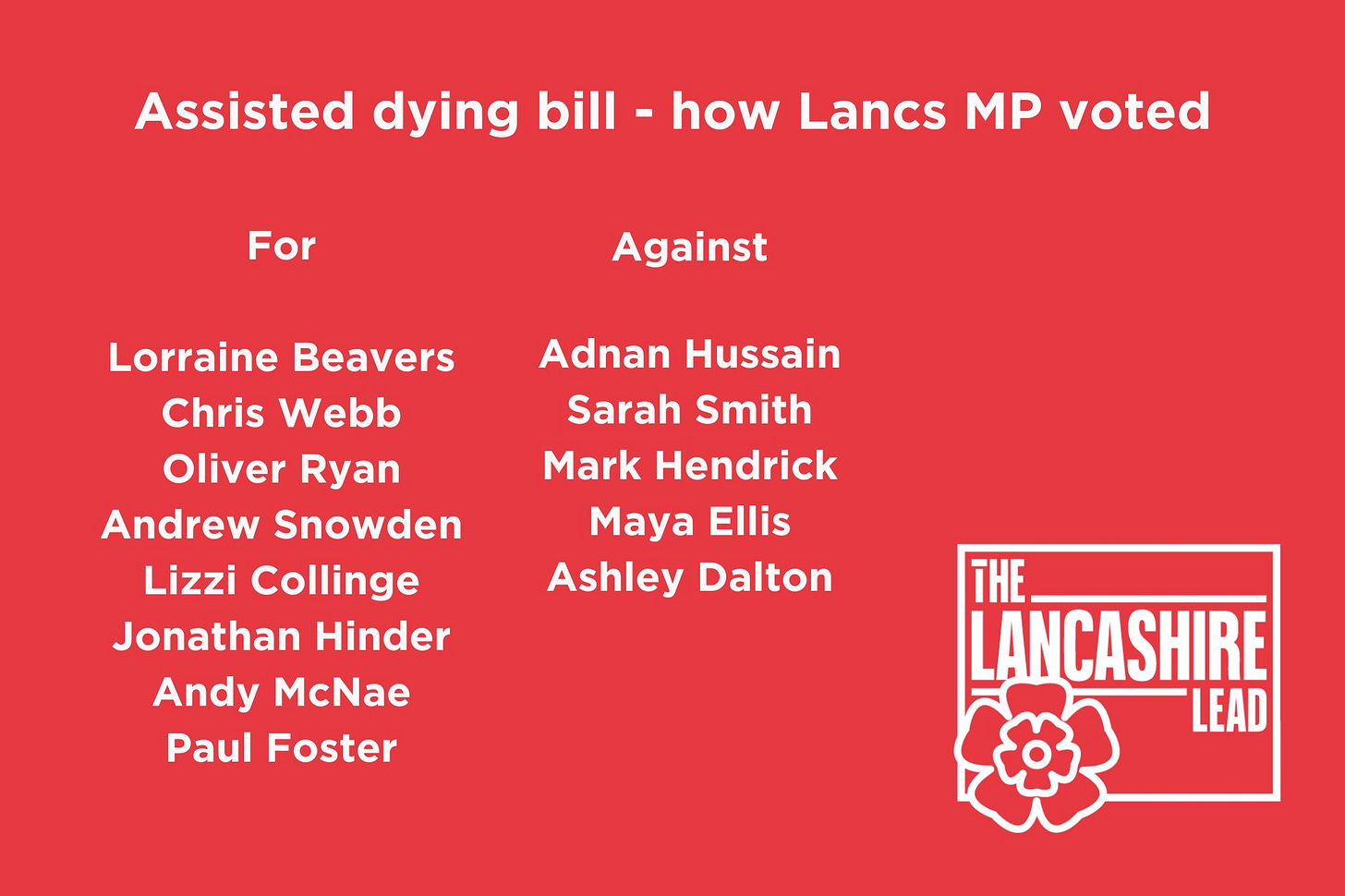Assisted dying: state-sanctioned death or preventing human suffering
Plus: The home where cats starved to death and paedophile police officer banned
Hello and welcome to the 74th edition of The Lancashire Lead. The main focus of today’s newsletter is the vote on assisted dying legislation which took place on Friday.
The issue is one which has long been discussed among specialists and those with experience but has never broken out into the mainstream as strongly as it has done now. It’s an emotive one, a morally challenging one, and one which requires long consideration from those with any impact on the decision making process.
The week has also seen more fallout over devolution proposals which would see councils abolished to bring Lancashire closer to having a mayor, East Lancs residents voice their opposition to a planned cemetery, and more police misconduct issues.
Today’s edition also contains news of the conviction of a woman who allowed 10 cats to starve to death. I’ve excluded some of the most harrowing details that were heard in court but I would still warn that it makes for very unpleasant reading and references some harrowing circumstances.
MPs divided in assisted dying vote
The assisted dying vote on Friday split Lancashire’s MPs with eight voting in favour and five against (Chorley’s Lindsay Hoyle could not vote due to his role as speaker, while Cat Smith of Lancaster and Wyre also did not vote).
It’s worth pointing out that the vote did not enable such deaths to become legal, but instead allowed the proposal to move to the next stage of the legislation process. I also suspect that when the snap election was announced earlier this year, prospective MPs had not predicted they’d be involved in something so sensitive so soon.
The five hours of discussion which occurred in the Chamber before votes were cast has been described in many quarters as being the best of UK politics, with MPs leaving aside party allegiances and speaking more openly and honestly than is usual. That was made possible through the respective political parties allowing the vote to be considered a matter of conscience and giving no direction on which way their representatives should vote.
As a result, the debate was almost entirely free of the usual politics we see, though Blackburn MP Adnan Hussain did attract some criticism for his intervention which drew in other issues. He said:
“The time for us to make this decision is wrong, frankly. At a time when 44,000 terminally ill pensioners are set to lose their winter fuel allowance—indeed, many of them have lost it—we are discussing whether we will pass a Bill, a state-sanctioned Bill, dealing with a taboo that many of us are reluctant to talk about.”
Hussain was interrupted by cries of disgust from fellow MPs and quietly sat down to allow the next member to speak. Later, he clarified his position, saying:
“I believe wholeheartedly that I have made the right decision in voting against the bill. I am deeply disappointed that a decision of this nature is being rushed through Parliament at this speed.
“Morally I am completely opposed to it, and I also believe it falls way short of having all the necessary safeguards in place.I will continue to vote against in all future readings.”
Among those to offer their interventions before the vote were the Bishops and Archdeacons of Blackburn Diocese who joined more than 1000 other signatories of a letter which warned against the dangers of a change to assisted dying legislation. The letter argued that safeguards and barriers will diminish over time and concludes:
“To reduce the value of human life to physical and mental capacity and wellbeing has sinister implications for how we as a society view those who experience severe physical or mental issues, and risks that those undergoing such suffering come to see their life as of less value than others. Once legislation is made, society itself risks coming to see these lives as of less value, too.”
But those in favour have argued that the pain and suffering experienced by those in their final days must be taken into consideration, as must their personal desires. Morecambe and Lunesdale MP Lizzi Collinge also made a point which I had seen discussed elsewhere, which involved a comparison to circumstances which already take place and see patients choose to die through withdrawal of treatment. She said:
“One of my close family members who would not be covered by the Bill’s eligibility criteria starved herself to death through withdrawal of treatment. She had been unwell for many decades with a condition that would have eventually killed her. At one point she became unable to swallow.
“For many years she had relied on artificial nutrition, and when the type of artificial nutrition she needed changed to a more invasive process, she said, ‘Enough’s enough.’ As a mentally competent adult under the current law, she was able to take that decision. People are already legally able to die early through withdrawal of treatment.
“I emphasise that she would not have been eligible under the criteria of the Bill, and I have no idea what she would have chosen if she had had a choice, but the fact remains that her capacity was assessed by a doctor and she was allowed under the current law to die early.”
Wrapping up her input, she echoed an argument made by the likes of South Ribble representative Paul Foster which is that voting yes in this case is only one step rather than a final decision. She said:
“We have the power through a robust legislative process to prevent human suffering. Good palliative care and assisted dying are not at odds. They are not in conflict. They both aim for the same thing: a good death, surrounded by people you love, with minimal pain and without fear.
“Today, we can vote for that in the sure knowledge that if the Bill passes its Second Reading, it will undergo further intense scrutiny to ensure that it is a good law that works as it is intended to do. This is the start of a legislative process, not the end.”
Russia vs Fylde
I’m not sure how often Lancashire MPs have found their names being published in official statements from the Ministry of Foreign Affairs of the Russian Federation but that’s what happened this week. Fylde MP Andrew Snowden was named alongside 15 Cabinet Ministers and various other figures who were banned from entering Russia.
Snowden and the others drew the ire of Vladmir Putin for reasons including supporting Ukraine, supporting “Russia-hating policy” and “spreading misinformation about our country”.
The Conservative took the sanction in good spirit, saying:
“It’s good to see my efforts in advocating for our ally Ukraine have not been unnoticed: The Kremlin has singled me out as a Tory MP to be added to the list of new UK Government Ministers banned from travel in their territories.
“I have not only been a strong and vocal supporter of Ukraine - but also putting pressure to ensure our Typhoon export orders to other countries in the region are secured, to give them the air power they need to ensure their protection from Russian aggression.”
Jailed police officer banned from force and another to face misconduct panel
I hadn’t expected police misconduct cases to feature so frequently in this newsletter but there are another two to be discussed today. The first relates to a Greater Manchester Police officer - 38-year-old Mark Rosebury - who was living in Bacup when he was jailed for possessing indecent images of children. You can read more about his criminal conviction in the Manchester Evening News’ coverage from September.
This week, a misconduct panel concluded that had he not already quit the force he would have sacked and Rosebury, of Earnshaw Road, Bacup was banned from policing for life. While that outcome is not at all surprising, it’s worth repeating this comment published within the decision report:
“Mr Rosebury’s conviction, inevitably brings the profession of policing into disrepute and clearly has the potential to damage the trust that the public have a right to expect of their police service. I believe the public would view these offences as abhorrent and the victims confidence in the police would be significantly undermined.”
Back in Lancashire Constabulary, another former officer will face a misconduct hearing accused of drink driving and doing so while responsible for a child. PC Robertson, whose badge number was 532, is accused of having been caught committing the offences in May 2022.
The hearing will take place on Monday, December 2.
Woman whose cats starved to death spared jail sentence
(Warning: graphic content)
Skulls and other body parts were found inside a flat where up to 10 cats were starved to death.
The animal remains, which also included jaws, legs and tails, were found scattered around the faeces and rubbish-strewn Skelmersdale home of Lynsey Alcock. The scene was described by one RSPCA inspector as ‘utterly heartbreaking’ and included a sink and toilet which had been drunk dry and where some of the cats had partially eaten others in desperate survival attempts.
Wigan Magistrates Court heard that RSPCA inspector Vicki Brooks had gone to the flat on April 12 last year after the charity had received reports that cats had been left unattended. Seals and markers were placed on the front door to see if anyone was coming or going - as is standard practice - but 48 hours later it was clear that no one was at the house.
Two days later, the officer returned to the address with officers from Lancashire Police. The door was still sealed and enquiries were made with neighbours who said that the occupants hadn’t been seen for up to two months.
In her written evidence to the court Inspector Brooks described entering the home and immediately seeing a swarm of flies and the remains of a deceased cat which appeared to have been partially eaten. She said:
“As I made my way through the flat I was, despite my years of experience, very shocked, disturbed and upset by what was found. The entire flat was filthy, covered in faeces and piles of rubbish and clutter were strewn everywhere.
“The flies were overwhelming and there was a very large presence of fleas. Amongst the mess the police officers and I found the remains of several deceased cats.
“I became conscious of crunching underfoot and upon closer inspection I found amongst the faeces a significant amount of skeletal and partially eaten body parts belonging to cats all over the floors of the rooms. There were no live animals in the flat. The scene was utterly heartbreaking.”
The court was told it was impossible to establish exactly how many cats had died at the property. It was clear they had died at different times because some remains appeared mummified but others were not as old.
Alcock, 24, denied one offence under the animal welfare act but was found guilty in her absence at a trial earlier this year. At a sentencing hearing on Friday, she was given a 26-week custodial sentence which was suspended for 12 months. She was also banned from keeping animals for five years and fined £50.
In her interview with the RSPCA, Alcock had claimed she had not lived at the address since September 2022, although witness statements heard in court disputed this. She said she had only been to the property once in late December of that year and then once again in February 2023 when she said she remained in a car whilst someone else went into the house.
In mitigation the court heard that Alcock, who was also ordered to pay £600 in costs and a £154 victim surcharge, had mental health issues and said she had failed to ensure that someone else was looking after the cats properly.
Speaking after the case had concluded Inspector Brooks said:
“This was a particularly harrowing and disturbing case for everyone involved. It was not possible to establish the exact number of cats that had suffered and perished whilst in Alcock’s care due to the condition they were found in at the property. It was a heartbreaking scene that will stay with me for a long time and I’d like to thank the witnesses and Lancashire police for the help and support they gave me throughout this very difficult and upsetting investigation.”
Packed crowd attends anti-cemetery meeting
By Bill Jacobs
More than 200 local residents packed a public meeting called to oppose a controversial new cemetery between Oswaldtwistle and Blackburn proposed by the charitable arm of the billionaire Issa brothers business empire.
They gathered at the Stanhill Social Club in Stanhill Road on Wednesday last week to vow to fight the scheme despite it having been scaled back from the original planning application which was withdrawn in January 2022 after a wave of protest.
The new planning application submitted to Hyndburn Council by the Issa Foundation earlier this month halves the size of the graveyard, reduces the number of plots by two-thirds and moves it to the North-West edge of the site near the M65 bridge away from any houses.
The ‘standing room only meeting’ was convened by local St Oswalds ward Cllr Zak Khan and his St Andrews ward Conservative colleague Cllr Steven Smithson and the ‘Stop the Cemetery’ Volunteer Committee.
Cllr Khan, who chaired the meeting, said those opposing the plan felt it was unneeded, wrongly located, could disrupt wildlife and the landscape, and lead to flooding issues. He also raised concerns over potential traffic and parking problems. Cllr Khan added:
“The development would permanently alter the area’s agricultural heritage an beautiful rural aesthetic, undermining its value as a community asset. The needs assessment makes it clear that there is no further need for more burial space in Hyndburn.
“Residents voice concerns over long-term maintenance and the risk that Hyndburn Council could be left with the financial burden of managing a site ill-suited to its purpose. We call on the Issa brothers to withdraw the application and recognise the anxiety and hurt it is doing by forcing this proposal on a proud town.”
In a statement responding to the meeting’s discussions, an Issa Foundation spokesman said:
“Many of the concerns raised during this residents meeting have already been addressed by professional advisers with relevant knowledge and expertise. Comprehensive reports have been completed including the need analysis, traffic impact, groundwater, and other associated considerations.
“We would like to reassure residents the area will be landscaped to the highest standards, with ongoing maintenance provided by the Issa Foundation. Additionally, this space will remain green in perpetuity and will a valuable community asset for future generations.”
A message from our sponsors Cosy Homes [many thanks to them for supporting The Lancashire Lead]
Rising energy costs are putting pressure on households across the county, making homes harder to heat and afford. That’s why Cosy Homes in Lancashire is helping thousands of residents access grants for home improvements—from better insulation to that new boiler you've been needing. With the support of 13 local councils, £80 million in funding has already been secured to make homes greener and more affordable. Is your home next? Apply today.
🚨 The death of a Blackpool teenager has prompted a coroner to call for change amid fears over the “underappreciated” danger of her prescribed medication (Blackpool Lead).
🤦♂️ A shop owner has had his licence to sell alcohol revoked after police found him drunk at his store (BBC).
🧑⚖️ A businessman and pub owner had to be forcibly removed from a million-pound farmhouse through court action after squatting there for more than a year (Lancashire Telegraph).
🌳 Preston’s largest and oldest park is set for a £3.9m overhaul that will see one of its historic features given a new lease of life (Blog Preston).
🧔♂️ Members of a beard club in Blackpool have said the group is a "safe space" for men to share their problems (BBC).
🏥 The parents of a man who was left severely disabled at birth have been awarded £9 million in compensation (Lancashire Post).
🌟 Efforts to ditch Blackpool's extended Illuminations season because it is not cost-effective have been dismissed by council bosses (Blackpool Gazette).
Additional reporting by Paul Faulkner and Robbie MacDonald
When Labour MPs submitted a letter calling for the abolishment of all of Lancashire’s existing councils (see previous editions) and the creation of three or four ones covering much larger areas, they would no doubt have expected plenty of opposition. That has indeed landed quickly (again, see previous editions) and there’s been more in the last few days. Here’s a quick summary of those:
Don’t lump us in with Blackpool
Echoing comments from Wyre Council’s leader, Fylde MP Andrew Snowden has warned his area should not be joined with Blackpool under a new single council area.
Snowden, the county’s only Conservative MP, warned the creation of a single coastal council would be “disastrous” for the wider area, noting the three authorities currently covering the Fylde – Blackpool, Wyre and Fylde itself – are serving “very distinctive and different places”.
“Each has very different priorities, opportunities and challenges. Given the relative size of Blackpool, the work that Fylde and Wyre councils do to meet the needs of their areas would be slowly drained off to fill budget shortfalls and priorities in Blackpool – and some of our most important tourist destinations, greenbelt areas and strategic industry sites would receive less investment, servicing and support.”
Blackpool Council leader Cllr Lynne Williams has previously disputed suggestions that her authority is in a troubling financial position.
It’s a man’s world
Speaking in the House of Commons, Lancaster and Wyre MP argued that a switch to fewer councils and giving more powers to a few regional mayors could lead to women being cut from local democracy and politics.
Cat Smith MP explained that evidence suggests the existing district council system enables a more equal gender balance in democratic life, whereas data relating to mayors and police and crime commissioners suggests women are absent.
The Labour MP raised her concerns in a Lancashire Day speech in which she outlined Lancashire’s history, its governance changes and its current set up. She continued:
“It is hard to see how a rural county that goes from edge of Merseyside and Greater Manchester to the edges of the Lake District – from the Irish Sea to the Yorkshire border – can be truly represented by just one man.
“I make no apology for saying ‘man’. We have seen the vast majority of mayors elected being men. I have no evidence to suggest Lancashire might suddenly buck the trend.
“Since 2012, Lancashire has elected a police and crime commissioner. A post only ever held by a man. Clive Grunshaw from 2012-21, Andrew Snowden from 2021 24 and now Clive Grunshaw again. I have a good working relationship with both men. However, the point stands that they are both men.
“It’s clear that no political party has even stood a woman for police and crime commissioner. So this doesn’t bode well for a future mayor of Lancashire. In 2012, the four candidates were all men. In 2016, the four candidates were all men. In 2021, the four candidates were all men. In 2024, there were three candidates and all men.
“So, by asking Lancashire to adopt a mayoral model of devolution, I feel we are being asked to devolve power from women council leaders, of whom roughly half are women, to a man as mayor.
“After all the progress the Labour Party has made by increasing women’s representation in Westminster, we have more women MPs in Lancashire than ever. Six out of 16. But new we risk undoing this progress by devolving power to men in our communities.
“We have women council leaders at Lancashire county, Blackpool, Fylde, Hyndburn, Lancaster, Rossendale, South Ribble and West Lancashire. There is something about this model of organising local government which seems to solicit a more equal gender balance of leaders. My fear that we are taking power away from these women leaders and regressing into a model which favours men.”
Rural communities risk being ignored
A Ribble Valley councillor says the needs of rural areas risk being overlooked if the number of local authorities in Lancashire is slashed. Ged Mirfin, a Lancashire county councillor for Ribble Valley North East, has set up a petition calling for a referendum before any such changes are implemented.
County Cllr Mirfin claims the proposed new authorities would leave less populated parts of Lancashire badly represented and under-resourced. In his petition, he writes:
“Quite a large proportion of the county consists of rural areas, villages and small towns, which, because of their smaller population, have fewer councillors."
“There is a very real danger that some councils and councillors will fail to recognise the needs of those of us resident in the more sparsely populated areas of the county.
“Pots of cash from central government would be swallowed up providing essential services like social care and schools – anything else would be added to a long list of ‘nice to haves’.”











